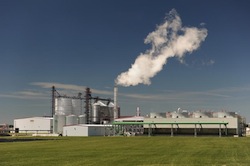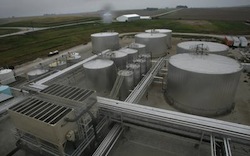 The Iowa Renewable Fuels Association (IRFA) has released a Top 10 list of efficiency and technology innovations of the past decade. IRFA Vice President and Absolute Energy CEO Rick Schwarck noted that while a lot has been written about the ethanol and biodiesel industry since the passing of the Renewable Fuel Standard in 2005, not enough focus has been on improvement in efficiency and technology innovations. The Top 10 list is a way of highlighting breakthroughs that have enabled the renewable fuels industry to persevere in challenging economic times, added Schwarck, while still producing low cost, high performance motor fuels.
The Iowa Renewable Fuels Association (IRFA) has released a Top 10 list of efficiency and technology innovations of the past decade. IRFA Vice President and Absolute Energy CEO Rick Schwarck noted that while a lot has been written about the ethanol and biodiesel industry since the passing of the Renewable Fuel Standard in 2005, not enough focus has been on improvement in efficiency and technology innovations. The Top 10 list is a way of highlighting breakthroughs that have enabled the renewable fuels industry to persevere in challenging economic times, added Schwarck, while still producing low cost, high performance motor fuels.
Top 10 Efficiency & Technology Innovations Over the Past Decade (click on the link to learn more about each number):
1. Corn Production Gains: In 2001, the U.S. harvested 9.5 billion bushels of corn from 69 million acres, for a yield of 138 bushels per acre. In 2011, 12.4 billion bushels of corn were harvested from 84 million acres, resulting in a 147 bushels per acre yield.
2. Ethanol Yield Increases: Since 2001, the average ethanol yield in the U.S. has increased 3-5 percent to roughly 2.8 gallons per bushel.
3. Water Utilization Improvements: Over the past decade, water use in dry mill ethanol plants has dropped from 4.7 to 2.72 gallons of water per gallon of ethanol produced.
4. Energy Efficiency Advancements: Compared to 2001, ethanol production today requires 28 percent less thermal energy (from natural gas or coal) per gallon and 32 percent less electricity per gallon.
 5. Lower Cost Feedstocks for Biodiesel Conversion: With roughly 80 percent of the cost of biodiesel production tied up in feedstocks, technology advancements that have made it possible to convert lower cost waste oils and fats into biodiesel have given producers much-needed feedstock flexibility to manage costs and maximize competitiveness.
5. Lower Cost Feedstocks for Biodiesel Conversion: With roughly 80 percent of the cost of biodiesel production tied up in feedstocks, technology advancements that have made it possible to convert lower cost waste oils and fats into biodiesel have given producers much-needed feedstock flexibility to manage costs and maximize competitiveness.
6. Corn Oil Extraction: This process, whereby oil is mechanically spun out of distiller grains, was nonexistent in 2001 but is now adding value to approximately 80 percent of dry mill ethanol plants.
7. DDGS Enhancements: Ethanol producers learned how to lower the starch and sugar content of the dried distillers grains (DDGS), and advanced process controls have allowed DDGS to be dried more precisely, assuring a more consistent product.
8. New Catalysts for Biodiesel Production: Catalysts reduce the time and enhance the level of biodiesel conversion.
9. Advanced Process Controls: The adoption of Advanced Process Controls (APC) has brought a new level of precision to renewable fuels production.
10. Unit Train Utilization: Today ethanol’s most common mode of transportation is 80-100 car unit trains that power directly from an ethanol plant to the final destination.

